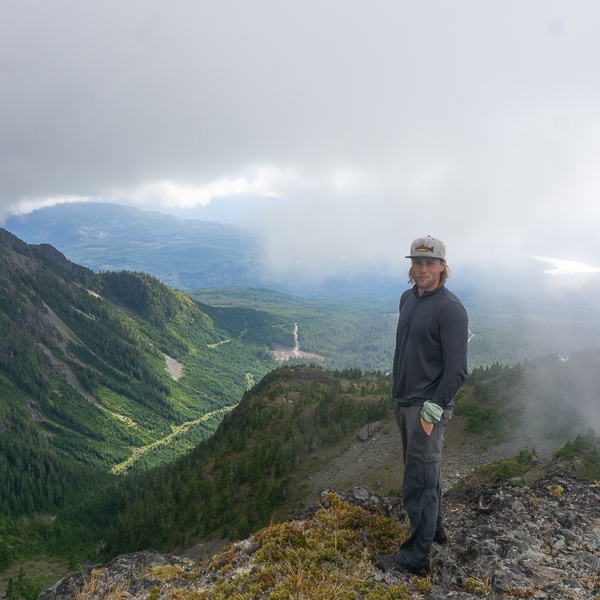Aquaculture Ambassador: John B. Relyea-Voss
“We are going to be working towards sharing information, experiences and stories of the new and exciting things happening within the aquaculture industry in British Columbia,” John B. Relyea-Voss, Council of Emerging Leaders in Aquaculture.
By Samantha McLeod
SeaWestNews
Aquaculture in Canada today generates $5.16 billion in economic activity and employs over 25,000 people. As one of the fastest growing food sectors in the world, the industry in Canada has a younger-than-average domestic workforce with two-thirds of all employees under the age of 35. Our new series, Aquaculture Ambassador, is about 14 Canadians who have come together to showcase the growing presence of young people in the sustainable future of farming the oceans. In this segment, we talk to John B. Relyea-Voss, Saltwater Technician, Brent Island, Cermaq.
Tell us a little bit about yourself?
I started as a Tech with Cermaq in December 2017. My background is in Business Administration and prior to working with Cermaq I actually worked in the technology industry. After selling all my possessions and packing up my car, I drove out to Vancouver Island in order to work in the aquaculture industry, and follow my passions for aquaculture, fishing, and exploring the outdoors.
What drew you to aquaculture?
Growing up I’ve always loved the water as well as fishing. In Ontario I was an avid fly fisherman. I think this planted the seed for me wanting to come out to B.C. After realizing I wanted to make the big life change, I was drawn into aquaculture as I saw so much opportunity within this industry. I work best in team environments where no two days are exactly the same, it was a perfect fit. Working in an ever-evolving industry where I can wear many different hats has allowed me to gain a wide range of skills as well as apply my current skillsets in order to help out my team at Cermaq and help move the industry forward in B.C.
What’s your average day in aquaculture like?
I usually wake up at 6:00 AM and I am out the door by 7:00. The first thing I do in the morning is check environmental conditions, as well as pull plankton samples to see what’s happening in the water. From here, I will do a daily safety inspection of our facility, as well as prepare for feeding our fish. While feeding, we use pan and tilt cameras to monitor the feed as it falls through the water column and adjust our feed rates in order to ensure that nothing goes to waste. Once feed is completed, we work on maintaining the equipment at our facility, whether that is cleaning nets, ensuring our compressors and generators are operating well, or preparing for upcoming projects. There are so many things our team does in any given day it’s hard to summarize an average day in such a short response.
Coming into the new year, Brent Island is going into full harvest mode so lots of time will be spent working with the harvest crews to catch our fully-grown fish and bring them to market. Between pulling seine nets, inspecting our fish as they enter the harvest boat, and completing harvest prep as well as post-harvest activities, this time of year is quite busy for us.
How do you plan to change the current narrative about aquaculture, in particular salmon farming in Canada, from conflict to conversations about sustainability?
Without divulging too much information about our current plans with the Youth Council, we are going to be working towards sharing information, experiences and stories of the new and exciting things happening within the aquaculture industry in British Columbia, as well as across Canada.
With all of the new recommendations published from the B.C. Steering Committee, there are lots of exciting changes happening within the salmon farming industry right now, specifically relating to reconciliation and newly formed relationships and dialog with First Nations in BC.
I believe there is a great opportunity to further develop these relationships moving forward, and I will be working hard to help share my knowledge of the great things happening at Cermaq and within the B.C aquaculture industry, in order to help alleviate some of the common misconceptions around salmon farming.
It will also be great to be able to share some stories and innovations happening within the diverse industry we have across Canada.
What is the single biggest project you are working on now?
Right now, the Youth Council is in full planning mode. Over the next couple of months, we will be working hard in order to finalize some of the exciting ideas tabled during our time at the CAIA Farmed Seafood Policy Conference. I am excited for all of these projects to get off the ground. We have a really amazing group of people on the council and I’m excited to start our projects together.
RELATED LINKS:
Aquaculture Ambassador: R.J. Taylor
Nathan Fong connected the world to B.C. seafood
Aquaculture Ambassador: Kenny Leslie
Aquaculture Ambassador: Kathleen Allen

